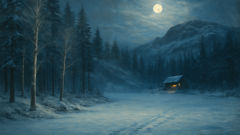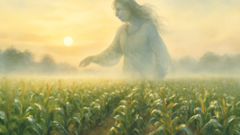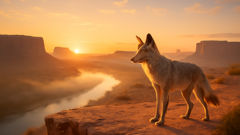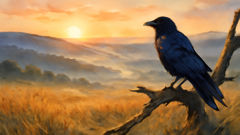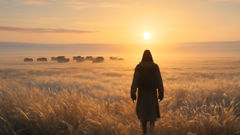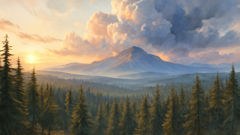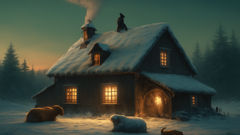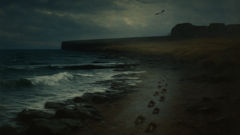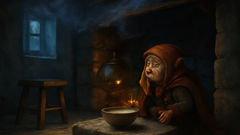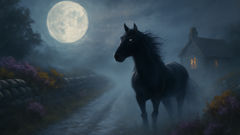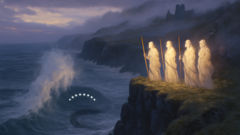Introduction
People in our town learned to count by winters. The years were thin or fat depending on how early the ice came and how long the snow creaked underfoot like a door that never quite shuts. I used to think the forest was a wall wrapped around us, a blue-green barricade that held out everything we didn’t want to think about. Then I moved away and discovered the truth every time I tried sleeping without the lake’s old breath punching quietly against shore: the forest doesn’t keep the world out; it keeps us honest. By the time I came back, mid-December and late to grief, the first storm had already shaved the town into outlines. Rooflines wore white shoulders. The snowplows coughed sunrise into crystals. The bait shop’s window was a papered rectangle that said CLOSED in a font that used to mean something. I parked beneath birches that ticked like teeth and carried my camera bag and a sack of groceries to the house my grandmother left me—a two-room box that had always smelled like cedar and thawing mittens. I came because my cousin said things felt wrong in the jack pine stands and because my aunt, who keeps a coffee pot in defiance of sleep, had begun folding our old stories more tightly, as if breezes had learned to read and were peeking. There are cautions you carry as quietly as you carry your own breath: don’t take from the woods what you can’t give back; don’t name what wants to be fed by your fear; if you must walk at night, walk as if your footsteps belonged to a person you love. Call it Wendigo weather, my grandmother would say when the thermometer bit its own tongue. Not a costume, not a movie monster. A lesson with claws. A hunger that grows when you feed it the wrong way. I found the thermostat, bled the pipes, listened to the house remember my weight. Outside, the lake stiffened in the throat of the bay. The forest didn’t blink. And from a ridge where wind makes a habit of hearing itself, something old loosened a story the way ice breaks a log from the shore and leaves it to drift toward anybody who whistles.
When the Trees Remembered Hunger
The first day back I walked the old snowmobile trail where alders shrug in from the edges and the high spruces crack like knuckles in deep cold. Snow had been driven into a new grammar by the wind, little ridges and commas. Crows unstitched the quiet and then re-stitched it. I photographed the lake at the place where the ice makes those low, creature sounds—whales in miniature, ghosts with bronchitis. The sun cut a brief window in the overcast and then let it fall. I wasn’t chasing a myth, not then. I was chasing proof of winter so my editor in a southern city would stop asking me if “up north” still existed anymore.
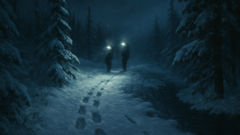
The story that found me instead was older than any byline, and it started the way such stories often do: with concern dressed in chores. My aunt Nora was hauling wood from the shed, the hood of her parka up, her breath thrown back at her through fur. “You didn’t bring good gloves,” she said, which meant she loved me. She tilted her head toward the woods. “Hank’s nephew’s been missing since Sunday. He went out before the storm to check a trapline west of the ridge and didn’t come back. Searchers found where he camped near Tamarack Creek. Lots of sign in and out. The old ones are quiet about it.” Nora never threw a legend at a problem. She fed people and fixed hinges and sharpened skates. For her to say the old ones were quiet carried weight.
I’d like to claim I ran toward the mystery with the courage of a folk hero, but the truth is my photographer’s hunger woke first: tracks in clean snow, a furnace of breath against moonlight, the possibility of catching the instant a small town holds itself together with mittened hands. I called the fire hall where volunteers coordinated search and rescue, told them I could shoot and haul, and received a destination and a caution. “Dress like you’re staying two days,” the chief said. “Storm’s breaking, but the cold’s going to bite.”
The meeting spot was the trailhead where the logging road dies into brush. Trucks idled, the steam of exhaust already drifting east. I knew half the faces and the other half by their families. Hank stood there tight and pale. He looked at the snow like it had lied to him. People spoke in low strings of words, the way cold shortens conversation to essentials: who had seen what, who took which grid, who last texted, where Tamarack Creek bends into the old beaver meadow. Somebody said the word Wendigo soft and immediate like a mitten dropped; folks pretended not to hear. Another man, one of the seasonal guys who come for holiday wages cutting pulp, cracked a joke that lived too close to cannibal stories, and the air itself flinched. The chief shot him a look. “We don’t feed that,” he said. “We feed each other.”
I strapped on snowshoes and checked the lens filters I knew would fog and fail anyway. My partner was a woman named Vi who drove school bus and, in summer, guided for a canoe outfit. She nodded hello like she was stamping an official form: you are now accounted for. We set off in the blue hour that comes early this far north, and the woods accepted us the way an old relative accepts a kid’s new haircut—with private skepticism and a willingness to try it for the day.
The snow absorbed everything beyond a certain softness. The cold changed the arithmetic of breath, broke it into fractions. We moved past balsam trunks black with shadow and into a low swale where willow wands made a cage of the path. Squirrel tracks crisscrossed, urgent about secrets I couldn’t read. Near Tamarack Creek we found the place where the missing man, Joel, had camped: the circle in the snow hard with settling, a shallow windbreak, a splash of ash that had tried to be a bigger fire and failed. Vi crouched, glove on the ground like a blind palm, feeling for the story beneath the top layer. “He left in a hurry,” she said. “Look how the snowshoe prints step off messy.” The prints led west into thicker spruce.
We followed and I felt the first pressure—not sound, exactly, not sight, but a thinning in the space between trees, the way a room grows larger when someone hungry has stepped out of it or smaller when they enter and pretend they’re fine. People will tell you the Wendigo runs on the howling of wolves and the cracking of bones and nightmares turned into antlers. Maybe that’s true for some. For me it is a pressure, a subtraction of the ordinary courage you carry in your pockets. It’s as if the forest withdraws a promise it has always made to those who walk it with humility: that you may be small here and still be allowed to pass.
We had no intention of invoking anything. We had the intention to locate a man, warm him, bring him home to a furious, relieved uncle. So we moved carefully. The light flattened and then sharpened. We touched the trees in greeting when we passed close enough to brush a sleeve, an old habit I don’t pretend is anything more than manners. And that’s when we found the first track that didn’t forgive itself. It was deep beyond the math of the snow. It had toes like a man’s but longer, the imprint too elongated for any boot we’d seen, and the stride—well, the stride belonged to something that had bargained poorly with bipedalism and decided to make it pay by taking space from the world. Vi stared and then chose the proper action of a person raised among winters: she looked away. Not stupidity—discipline. “We keep on the human prints,” she said. “We don’t stare into the hole that wants us to fall in.”
We kept on. The trees closed tighter. The creek, under its lid of ice, talked to itself in vowels shaped by stone. When dusk finally admitted night, we lit our headlamps. Snowfall began again, the kind that comes without announcement: fine as sifted flour, a million small votes for silence. Somewhere far off, a single crack like a rifle shot announced ice expanding on the lake. Branches tossed their white burdens with soft thumps. Then came the first borrowed voice.
“Vi?” It sounded like the smallness of a scout returning to camp late and hoping no one noticed. Vi stopped, not from fear but from the reflex to check the ones you love. The voice came again, too distant, too convenient, the syllables parting like bark in thaw and freeze. “Vi, you got a line on me?” She took off a glove to free her hand for the radio. But the radio hissed like a cat. No signal. The sound came again, closer, and under it a new thread of noise: a shallow panting that wasn’t out of breath so much as out of patience. Vi put her glove back on. “We keep to the plan,” she said, as if reminding herself more than me. “Don’t let hunger decide our direction.”
We pushed forward another hundred yards and stopped to listen. Snow filled the dim; our headlamp beams were short-stemmed flowers. That pressure returned—like the absence of warm air under a door becoming a draft, then a theft. I remembered the stories I learned not as entertainment but as caution labels on the wilderness: the Wendigo is a hunger that eats even after the end of appetite; it borrows voices to make you open your mouth; it looks like what greed does to a body when it begins to live for itself alone. The old people would stop there. They didn’t etch this creature into detail. They refused to feed it with description. They left its face where it belonged—behind the door you keep shut in your mind when you’re tired and could be tempted to bargain with something that never bargains fair.
Our path hooked uphill along an esker. Joel’s tracks wobbled. He had been here. He had turned his head this way and that, the snow scattering where he stumbled as if he had argued with his own feet. My breath found that old winter rhythm: in by the nose, out by the mouth, repeat, count. Then the trees to our right, the dense cluster of black spruce, contorted in the wind the way a person will twist to hear temptation speak from the better ear. A shadow moved where shadows had piled up. I stiffened. Vi didn’t lift her light. She said, steady as tying a knot, “If you’re Joel, say the name of the dog we gave you when you were ten.”
The woods, which understand jokes better than most people, held. Then the shape exhaled, and the exhale was wrong, too much like the hiss of steam escaping a pipe that hadn’t been told it was part of a home. “Rover,” the voice guessed. I looked at Vi. She shook her head just a hair. “Nora,” she said quickly to me, as if we were at a kitchen table and the tea kettle had just begun to sing. “We go back to the last good sign. We widen the circle. We will not be lured thin.”
That wasn’t what my hunger wanted, the hunger that borrows legitimacy from usefulness—find him, be the hero, write the story. But the north has a more ancient syllabus. We turned and paced back to the campsite by the creek, and there we built a fire in a metal pan required by the winter rules, the flame licking a language we could read without fear. We radioed the chief when the signal found us as if it had forgiven us our stubbornness. “Hold there,” he said. “We’ll bring the circle to you.”
And the circle came: headlamps bobbing down the trail like a little constellation dedicated not to gods but to neighbors. The pressure eased, not because the legend fled, but because the legend lost leverage. The Wendigo, if you want it named, dislikes rooms full of shared breath. It wants you alone with your bargain. We didn’t bargain. We poured coffee. We told the kind of foolish stories that test whether a person’s laugh has thawed yet this season. And near midnight—when the cold was at its purest and our eyelashes carried winter like a second set of lids—Hank’s radio crackled with news from another team. They had found Joel huddled in the lee of a rock face, stubborn, shivering, angry to be rescued the way a drowning man sometimes fights the arm that hauls him to air. He had heard voices, he said, his eyes flicking away from the light. He had heard them offer him shortcuts through the dark. He had followed until the map in his head turned cheap, all wrong angles and no rivers.
We walked him out at dawn, thread by careful thread, and the wind, which dislikes triumph, made our eyes water as if to keep us humble. On the lake, the ice sang again, that whale music from a throat we cannot see. Somewhere in the trees, a crow took off with the confidence of a judge who knows what he knows. We didn’t discuss the footprints that weren’t footprints because we had not photographed them and had no interest in finding that our evidence had turned itself into blur. We discussed chili seasoning. We discussed pickled beets. We discussed the cost of fuel oil and the cheapness of gossip. The sun made the snow into a million mirrors that returned its light right back where it came from: sky to ground and back to sky. I thought of my grandmother’s definition, the one I’d avoided because it was so plain it embarrassed me: Wendigo is what happens when you forget that a person is part of people. The woods let us pass. The town opened to take us in again, not as heroes but as participants in a practice older than any headline: not feeding the wrong thing.
The Blizzard and the Borrowed Voice
It would have been a good ending for a town hungry for relief, but winter likes sequels, and greed rarely accepts the first no. Two days after Joel came home, the sky flattened into a lid. The forecast said a “clipper,” which sounds playful if you’ve never lived with one. By noon, flakes were angled like slanted handwriting across everything, and the wind sharpened its questions. I worked at my grandmother’s table with a pot of venison stew making the house smell like Sundays, trying to turn my notes into sentences that didn’t perform fear for the page. The phone vibrated across wood. Vi: “You still have those good boots? The new plow driver ditched his rig on Old Quarry Road. He’s fine. Wants to walk back. I don’t like him walking.”
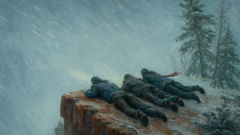
We met at the corner where the Lutheran church makes a white triangle of faith against the pines. The storm had arrived with a plan: blind, bury, confuse. The wind used the streets as a mouth and we were hot soup in it. Vi adjusted the scarf on her face with gloved knuckles and her eyes said a thing she didn’t, that there was a second reason to walk into this weather beyond a county employee stuck in a drift. “He said he heard someone crying up near the quarry,” she said finally. “Said he heard it through the cab glass and it sounded like a kid.” The quarry is an old scar cut from granite and iron and greed. It holds stories like cold holds cracks in boards.
We learned the quarry path as children, the way you learn where the lake behaves badly under new ice. We knew where the sumac marks the two-thirds point and where birch bark has been pulled away by hands that may have been respectful or not. We knew, too, that the quarry forms its own weather, its steep walls scraping the wind into wedges. That day the quarry behaved like a throat swallowing words. We went anyway, because if the crying was a human crying we had answers for it—body heat, a blanket, the old gospel of hot tea. We would not be the people who stayed home in a warm room and later had to hold the weight of that decision.
The plow driver, Trevor, met us near the first bend, an outline with cheeks raw where the scarf had failed him. “I know it sounds stupid,” he said through chattering teeth. “But I thought… I thought somebody was down there, and the drift—my truck went squirrelly, and I had to walk. Then I figured if it was a joke somebody played last summer and there’s a speaker down there or something, well, I’d look right. And if it wasn’t a joke I couldn’t just go home.” I liked him for that. I disliked him for the uninvited thing that now walked with us, the thing that prefers lonely decisions made under pressure.
The snow took the shape of our legs and claimed it. The birches wrote white on white. Wind penned edits across our faces. At the quarry lip we lay on our bellies and peered over, the way we had been taught: spread your weight, make yourself wide, be a problem for the ice if it tries to read you as a stone. Down below, snow streamed through red rock like smoke. The crying came then—thin and wet and human-fragile—then stopped at once. “A fox?” Trevor asked hopefully. I wanted to reward hope, but foxes keep their dignity in winter. They don’t make a child’s mistake of sobbing without pause. The sound came again, this time from the opposite direction, and Vi’s eyes narrowed. “Borrowed,” she said in that flat school-bus-driver tone kids obey without thinking. Then she turned to Trevor and added with a different kindness, “We don’t chase this. Not in wind like this. You’ll be walking back with us.”
He didn’t like it. The quarry has that effect on people who can still be persuaded to mistake risk for a ritual that will baptize them into bravado. He started to stand and the wind shoved him. I pulled him down by the jacket and Vi said, “Listen.” We listened. Under the crying, a second sound changed the weather of the cliff. It was a scraping like bone over rock, but slower, as if the rock were made of bread and someone hungry was deciding whether to be polite. I did not look for it. Not because I’m brave, but because I grew up on the advice that saved people long before GPS: do not volunteer to be audience. Let the thing that needs a stage play to empty seats.
We backed away from the lip and stood, and the wind rearranged us into figures that belonged to the road rather than the pit. The snow filled our footprints as if choosing us never had happened. We turned, and the borrowed crying moved with us for a space, then lost interest the way anything bored of its own trick will. Trevor sobbed once in a single, violent correction to his pride and then grinned, self-mocking, as if to apologize to himself before we did. “I’m not a coward,” he said. “No,” Vi answered, “you’re a neighbor, which is different.”
The road that used to be was not the road that was, but both worked because the woods remember where people passed. It took us an hour to fight back toward town. Twice we stopped and stood behind pines for the wind’s big pushes, the way you do in high gusts so the forest takes the brunt. I felt the pressure again like a hand on a doorknob, testing if the latch has worn. My grandmother used to say: doors are more than wood; they are promises. The promise I felt failing was the simple one I had made to myself: I will not turn this into a spectacle. I will not give the hunger a name just to get a headline.
The wind made the town into a sketch of itself, and in that sketch we found shapes we recognized—church spire, the stubborn green of the gas station sign against white, the ribbon of a snow fence trying to teach drifts to behave. We walked Trevor to the fire hall where the chief pushed a mug into his hands and nodded once to us and didn’t ask any questions that would lead the wrong direction. When I finally made it home and peeled my layers off like an onion refusing to be chopped, the stew in the pot had gone from perfect to too soft, and I ate it anyway because wasting food feels like inviting winter to sit in the good chair. The house creaked its winter creaks, and the storm put its shoulder to the door without any metaphor required.
That night I slept and woke and slept and woke, the way a house will rouse you when it wants you to share its watches. Once I woke to the sound of someone sweeping the porch. I lay there and named the ordinary: wind, branches, drifting. Then came the whisper through the door, the exact rhythm of my cousin when she called after dark to ask if I had enough milk or if I wanted the last of her pie. “Mara,” it said. “The porch is a mess. Let me in; your latch sticks.” I didn’t move. The whisper pressed a little harder, still warm with the kind of humor we use to refuse fear. “You always forget this door. It leaks heat. I’ll fix it.” My hands ached to reach for the knob if only to prove how steady they could be. I kept them where they were and counted the distance between my ribs.
It was patient, and that’s the trouble with winter hungers. They have nothing else to do. It tried my aunt’s voice next, then the clerk at the hardware store who collects bottle caps, then my own, which was poor mimicry and convinced me I still had a voice that belonged to me. Finally it tried my grandmother, and I understood again what mercy looks like when it chooses to be strict. The voice was perfect except for grace. My grandmother didn’t ask to be let in. She would have waited for me to open in my own time. “Grandma?” I whispered to the room. The heat ticked through the baseboards like a small parade. I smiled, not because I felt safe, but because I knew the difference between love and leverage.
Before dawn the wind lost interest in me and the house. The storm slouched east with the humility of someone who broke a plate and swept up the pieces. When I opened the door in morning’s weak light, my porch was clean. Not with the tidy squares of a broom but with the wide, greedy marks of something that had licked the snow. The tracks on the steps were too deep, too long, the stride wrong. At the bottom, a scattering of rabbit fur made the air smell like coinage. I didn’t photograph it. I shoveled. I salted. I boiled water for oatmeal with raisins the way my grandmother used to insist was better than any dessert. The legend had visited. I hadn’t fed it. But I could feel it perched and thin and watchful at the edge of the map that mattered—where town becomes timber, where timber becomes a set of choices under pressure.
The call came around ten: the grocery’s delivery truck had slid into a snowy culvert on County K. The driver was fine; the cargo was not. The word cargo meant food—a week’s worth for households whose pantries had run low after the storm. Winter is good at making need immediate. The driver’s voice shook on the phone as he explained his own math: shelves empty of bread and milk and eggs; people without power; the nearest tow too slow. The old hunger clears its throat any time you can map scarcity and hear coins clink. A council of the impromptu formed without fuss: us at the fire hall, the church, the Ojibwe center at the edge of town, the school where a janitor has keys to everything that locks and unlocks. We planned a convoy and a brigade. We didn’t plan on a monster. We planned on people whose kids would need dinner.
Maybe that’s why the pressure eased as we worked. Not because the Wendigo had given up, but because it had less grip on the story we were writing with our hands: the story where a town becomes a kitchen. We hauled boxes from the truck with mittened fingers; we formed the kind of human chain that reminds you nothing in geometry is more beautiful than a circle. I heard a cry once in the woods beyond the road and didn’t turn. A dog barked like it had heard it too and then decided squirrels were more interesting. By sundown, every shelf in the little grocery held what it needed, and a separate room at the community hall held what some could not afford. We didn’t pretend the math was fixed. We accepted that it was ours to keep fixing. The hunger that wears antlers hates that kind of math. It prefers a ledger with teeth.
That night I wrote for my editor and deleted half of what I wrote. The sentences I kept were about how a cold town warms itself: with chili cook-offs and boots left by neighbors’ doors in a muddy hello; with advice shouted across plow berms; with loans of extension cords, jumper cables, space heaters. I kept the part where the wind tried to turn my porch into a stage. I deleted the part where the tracks looked like fingers and promises. I slept with the radio murmuring hockey scores and fate arguing with the puck. The house approved, or maybe it simply slept too.
Toward morning I dreamed the lake hummed beneath ice like a machine that forgot it had a heart. I woke to find the hum belonged to the furnace and to realize—like a bird startling itself off a branch—that I had learned a new rule that was actually old: don’t chase the voice that offers shortcuts; chase the chore. Greed is loud; generosity is steady. The legend had walked our roads and scraped its elbows against our doors. It had not gotten fat. It was still there, though—the winter’s shadow with a mouth too wide for its face—waiting to see which hunger we would feed when the next test came.
What We Feed Grows
The next test ran on money and memory, an easy combination for winter to weaponize. You could see it coming in the form of men walking with their shoulders back in a posture you can buy in certain catalogs. They represented a company with a name like a promise—Northern Future—whose van had a logo in cheerful green. They had maps with pins in a tidy forest of hope and a project that would “bring jobs, modernize, make your kids stay,” the way people who must not have been invited to our potlucks often speak to us. They had been sniffing around for months, offering landowners price-per-acre numbers not unkind to the ear. The site they wanted was at the top of the ridge where the jack pine stands kink and the glacial boulders look like the backs of sleeping oxen. The elders shook their heads. The water table there threads under everything. Spill there, and the creek becomes a courier for poisons.
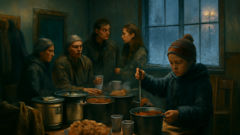
It wasn’t my decision, and yet I felt the decision tug at my sleeve like a child with news. I wanted to mind my own business. I also wanted to mind the business that keeps a town’s house standing—what we all breathe, drink, heat, walk. The company scheduled a meeting at the school gym and brought coffee in gleaming urns that told you they had calculated how much caffeine a conscience needs to waver.
Some showed up ready to nod. Winter makes even decent people count their bills twice. “A season or two of good pay would fix the roof,” a woman near me whispered to her friend through her scarf. A man grunted something about kids who had moved away because the only work left was seasonal. The men at the front smiled like well-fed wolves who had taught themselves manners in business school. They used slides of families standing together and slides of water so blue it looked like a cartoon had colored it. They spoke of safeguards and oversight and words that act like blankets—compliance, mitigation, reclamation—and that’s the trouble with blankets: some cover, some smother.
I don’t know if the Wendigo attends civic meetings. I suspect it doesn’t have the patience. But hunger attends. The kind that eats slowly, the kind that tells you a small bite of what you promised not to eat will be fine, just to get through this winter, and then you can go back to your old vows in spring. Maybe what the old stories meant by Wendigo was simply this: the portion of a human that forgets the plural we were made to live in. When the microphone squealed and Nora took it—her hair uncooperative, her gloves still on—I saw that plural gather around her like a second coat.
“We are not against work,” she said without raising her voice. “We work every day. We work at keeping each other alive. We work at reminding ourselves where our water runs and who taught us to say ‘thank you’ for fish. We work at winter. If you bring trucks and pipes into the ridge above Tamarack Creek, do not tell us we’re crazy for seeing a spill in the corner of your smile. And do not tell us our children need saving from the lives we built with our hands before there were logos.” She didn’t pound the lectern. She didn’t weep. She set the microphone down like a mug set onto a table that has held similar mugs for a century.
The company men learned how to lose gracefully. They promised to return with different plans. They left a stack of brochures like bandages no one wanted to wear. Afterward, we put away chairs with the efficiency of a town that knows chair-stacking as one of its liturgical acts. In the parking lot, someone had brought a giant pot of venison chili and the steam rose into the blue and the smell was the kind that convinces even the grumpiest teenager to reconsider engagement. We ate in the low gold of late afternoon, our breath mixing the way it does when people agree to stay in the same weather on purpose.
That night, the hunger that hates circles came back with a different strategy. It knocked on the back doors of those who had wanted the jobs and whispered bargains in a winter voice that can make greed feel like care. I know this because the next day at the post office, a man I like and sometimes fish with in summer told me he didn’t sleep for listening to someone who sounded like his father list the exact costs of his life and the cheapness of hope. “It sounded like Dad,” he said, his hands telling the story upside down in his pockets. “Except Dad never said despair was practical.” We stood there the way people stand in foyers with snow melting off boots: half-in, half-out, a threshold where the air is confused. He shook his head, then laughed. “I went and made eggs,” he said. “Sausage too. Woke the baby with the smell. If you cook at midnight, the wrong things shrink.”
Eggs and sausage are not a magic spell. They don’t cancel a lease signed in a hurry or a well drilled in the wrong place. But they participate in a resistance older than asphalt. The Wendigo doesn’t starve because you shout at it. It starves because you feed each other instead. We started seeing small, practical feasts appear like mushrooms after good rain. A slow cooker under the mail slots at the post office. A crock of soup in the hardware. A big pan of frybread at the Ojibwe center with a hand-lettered sign that said for everyone. People slid five-dollar bills into a jar next to it if they had it and tore pieces of bread if their pockets were honest in a different way. A woman with a baby on her hip stood in the church hall refilling Styrofoam cups with cocoa, and when the pastor asked why she laughed and said, “Because it’s winter.”
I can hear the impatience of a certain reader, the kind of city mind that has kept me fed sometimes: where is the creature? Where are its antlers and its endless teeth? Why include meetings and meal trains in a story that promised a monster? Because the monster is what happens when you choose not to include those things. It thrives best where the table is empty and the room is divided into chairs that face only forward.
Still, if you need a sighting, if you need the camera pulled back so you can squint and say there, then I’ll offer you the hill above the frozen creek on a night that felt like a dropped nail. The sky was brittle. The stars sounded like glass if stars could sound like anything at all. I’d walked up there because the words weren’t lining up and sometimes you have to let the cold knock grammar out of you. The ridge wore its usual headdress of jack pine and ache. The maple at the bend had a ring around it where deer had eaten the bark down in a hungry year. I sat with my back against granite that had learned long ago how to keep secrets by never speaking and watched my breath become a small, stubborn cloud that refused to join the sky even though that’s all it wanted.
Across the creek, something paused in the trees and the paused thing was tall enough that the lower branches pressed an apology against it. It breathed in a rhythm that had forgotten health. The air around it went wrong in the way heat makes air wrong above asphalt in August. It would have towered if it had been a single thing. But I knew better than to name it singular. It was the sum of every decision that tries to isolate you from your people and then sell you back to yourself at a price. Its mouth was not a mouth; it was a subtraction. Its eyes did not shine; they took. It had dressed itself in our leftovers—the rumor of antlers, the economy of starvation, the manners of a trickster who forgot jokes must end with a laugh. I breathed, and kept breathing, and I thought about the eggs at midnight, and the slow cooker under the mail slots, and the way the kids drag sleds up a hill and forget to be anyone else but kids. I thought about my grandmother’s hands and how their work had always been the least theatrical form of love available to a person in winter.
“Go eat the quiet,” I said, and if that sounds like a curse it wasn’t. It was a suggestion made in the direction of a problem not meant to be solved by looking at it. I stood and walked back to town, not quickly, because speed would have meant I had chosen to let fear draft my steps. Behind me, the pressure changed its mind the way a weather front will when it meets a lake. At the bottom of the hill, two teenagers were arguing about a hockey stick. Their breath looked like small wolves trying to chase a bus. “Hey, Mar,” one called. “You want chili? Mom made too much.” The Wendigo is supposed to be tireless. Even tireless things grow bored when nobody claps.
We got through the heavy winter the way people always have who were not meant to be extraordinary but insisted on showing up. We fixed stoves. We swapped recipes with the seriousness of surgeons. We fished on the lake and apologized to the water when we took more than we meant to. We returned cough syrup bottles to people who had lent them. We made lists of who needed wood and whose porch steps iced over and where the plow throws a tantrum on a curve.
When spring’s first rumor moved through the pines—a drip more insistent than a clock, the smell of earth holding its breath longer than seemed possible—the company men returned with smaller smiles and larger spreadsheets. They left again with the same amount of confidence we had, which is to say, enough for a day. Joel started coming to chili nights, sat near the door with his hat on his knee, and learned how to stop flinching at heat that did not require repayment. Trevor laughed at himself from behind a snow shovel and told anyone who would listen that he had heard a speaker at the quarry playing a prank and then winked in a way that made the old men nod; lies told with humility become stories, and stories—told right—install rails where a trail drops off.
The legend didn’t leave; it never does. The hunger remains what winter uses to test our architecture. We failed sometimes. We spoke too sharply at people too near our own fear. We were tempted by wind that said hurry and paperwork that said maybe this once. But we kept feeding the right table. We kept saying each other’s names in the right voices. We kept refusing to make the monster a mascot. If you need a photograph, pick the one where we’re shoveling the grocery truck together, faces raw and laughing because somebody made a joke about soup, and the wind, finding no purchase, threw its boredom at the trees.
My article went out. It was read and argued with and ignored and kept. It did not claim ancient authority. It did not describe ceremonies that do not belong to me. It said only this, in more words: the Wendigo is a caution we are better for remembering. Feed it and it will wear your face until you forget the difference between a bargain and a theft. Starve it and it will go skinny around the edges and find somewhere else less stubborn to haunt. The town’s spring thaw came on like forgiveness, which is to say irregularly, with setbacks, in dirty heaps that looked like failure until they were gone. And beneath the snow, a hundred small green things chose us again, the way they do every year, for no other reason than because that is their nature: to feed on light, to grow, to offer themselves up to mouths that have learned what hunger deserves and what it doesn’t.
Conclusion
People ask for endings that feel like locks. But winter teaches different mechanics: latches, hooks, knots you can undo and tie again as the weather requires. What I can give you is not a trophy dragged from the forest—the Wendigo posed for the lens like an indictment. What I can give you is a town that chooses, over and over, to feed the table, not the dark; to open the door to a neighbor’s knock and keep it shut to a hunger that borrows loved voices to sell you your own solitude at a markup. The legend remains because it’s useful. It puts teeth on a sentence our ancestors perfected for climates that will always try to pry us apart: do not break the circle that keeps you human. In the north woods, this translates to acts as small as eggs at midnight and as large as saying no to a plan that would richen a few while thinning the rest. It sounds like chili simmering where strangers and cousins just sit down. It looks like a kid’s boot drying by a heat vent, steaming like a small locomotive ready to go back into the cold. When the ice sings and the trees crack and the wind invents a voice that claims to know you better than you know yourself, you answer by naming your people and the work you do for one another. The Wendigo goes lean in such weather. It wanders the tree line, restless, looking for a door that opens on the first knock. Our door—most days—we keep latched with habit and care, our house warm with the old arithmetic of we, our breath a steady fog that refuses to be a spectacle and endures long enough for spring to recognize us again.

